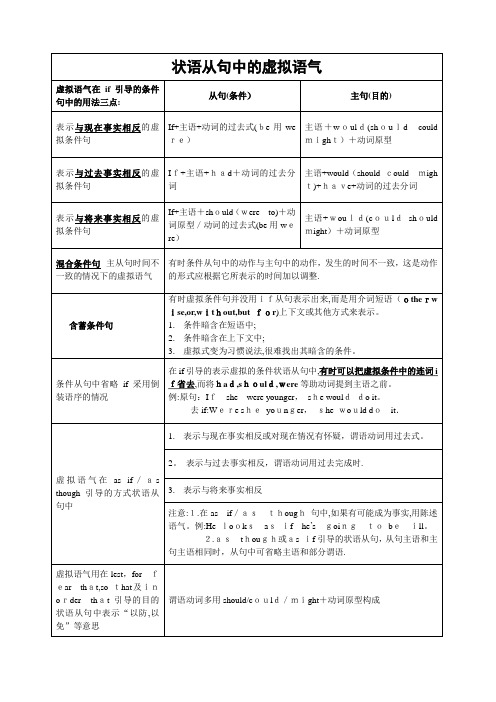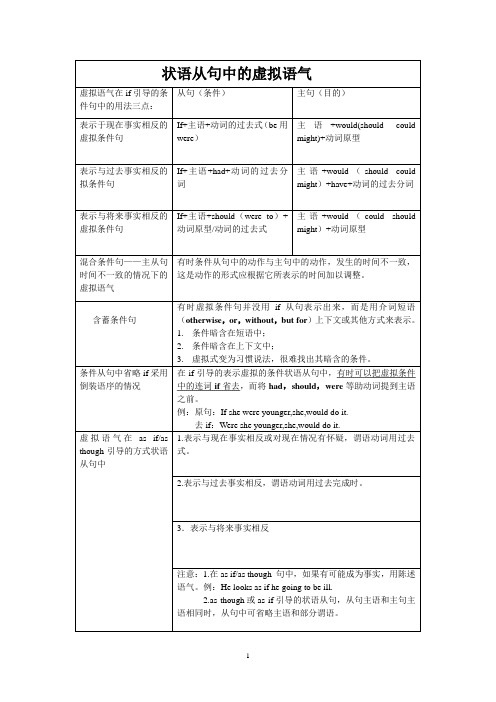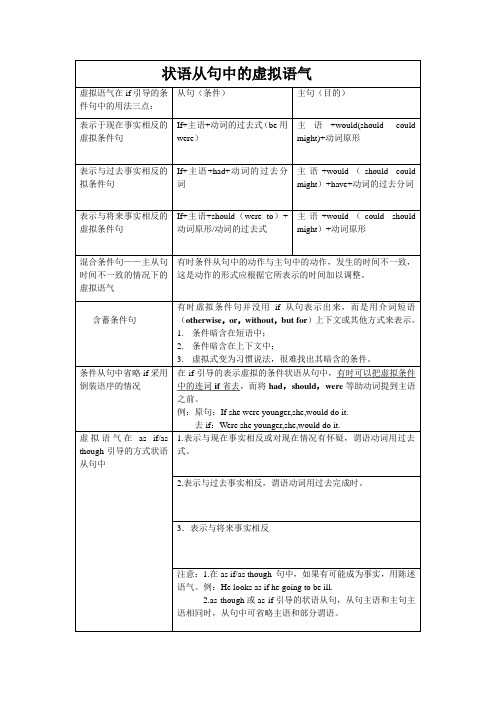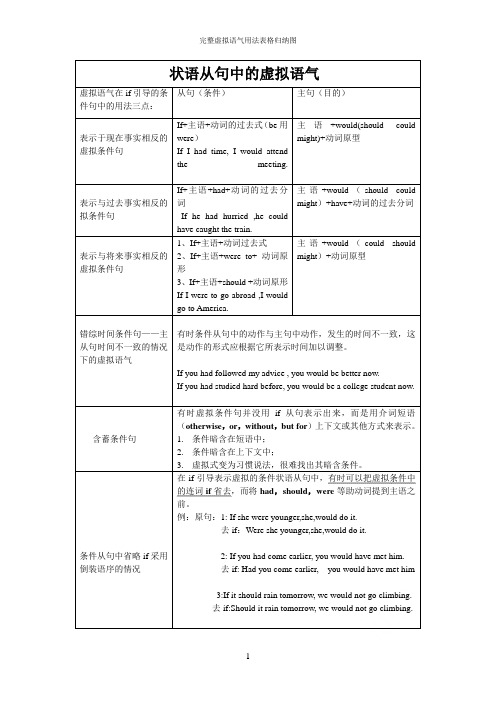完整虚拟语气用法表格归纳图
虚拟语气表格归纳

“In case”引导的从句 中既可用陈述句,也可以用 虚拟语气
(should)+动词原型 例:1.The game will be put off in case it (sh ould) snow.
If onl y引出感 叹 句,意思是“要是…..多 好",表示说话人的一种 愿望.(与wish 后的 虚拟句型相似)
例:If only he didn’t drive so fast!(现在) If only the rain would stop。(将来) Look at the terrible situation I am in! If I had followed your advice(过去)
表示建议,命令,请求,道歉,怀疑,惊奇等。
在“It is (was)+名 词+that….。”结构句中 的虚拟语气
这类名词有:advice,decision,desire,demand,idea,order, p i ty,pr o po s al,re c o mme n d a t i o n , s ugge s ti o n,sur p r i s e,wish,wonder 等。
含蓄条件句
有时虚拟条件句并没用if从句表示出来,而是用介词短语(otherw ise,or,without,but for)上下文或其他方式来表示。 1. 条件暗含在短语中; 2. 条件暗含在上下文中; 3. 虚拟式变为习惯说法,很难找出其暗含的条件。
虚拟语气表格归纳

名词性从句中的虚拟语气
一:宾语从句中的虚拟语气
1.在动词wish/holp后的宾语从句中的虚拟语气
对现在情况的虚拟:从句谓语动词用过去式或过去进行式。
对过去情况的虚拟:从句谓语动词用过去完成时,或would,could,might+现在完成时。
3.表示与将来事实相反
注意:1.在as if/as though句中,如果有可能成为事实,用陈述语气。例:He looks as if he going to be ill.
2.as though或as if引导的状语从句,从句主语和主句主语相同时,从句中可省略主语和部分谓语。
虚拟语气用在lest,for fear that,so that及in order that引导的目的状语从句中表示“以防,以免”等意思
对将来情况的虚拟:从句谓语“would/should/could/might+动词原形”。
在表示建议,命令,要求,忠告,等动词的后面的宾语从句中的虚拟语气
均以“should+动词原型”表示这种语气,“should”常被省略。
常用的此类动词有:
表示“提议,劝告,建议”的:propose,suggest,recommend,advise.
状语从句中的虚拟语气
虚拟语气在if引导的条件句中的用法三点:
从句(条件)
主句(目的)
表示于现在事实相反的虚拟条件句
If+主语+动词的过去式(be用were)
主语+would(should could might)+动词原型
表示与过去事实相反的拟条件句
(完整word版)虚拟语气表格归纳

状语从句中的虚构语气虚构语气在 if 指引的条从句(条件)主句(目的)件句中的用法三点:表示于此刻事实相反的If+ 主语 +动词的过去式( be 用主语 +would(shouldcould虚构条件句were)might)+ 动词原型表示与过去事实相反的If+ 主语 +had+ 动词的过去分主语 +would ( should could 拟条件句词might ) +have+动词的过去分词表示与未来事实相反的If+ 主语 +should( were to) + 主语 +would ( could should 虚构条件句动词原型 / 动词的过去式might ) +动词原型混淆条件句——主从句有时条件从句中的动作与主句中的动作,发生的时间不一致,时间不一致的状况下的这是动作的形式应依据它所表示的时间加以调整。
虚构语气有时虚构条件句并没用if从句表示出来,而是用介词短语委婉条件句( otherwise ,or ,without ,but for )上下文或其余方式来表示。
条件从句中省略 if 采纳倒装语序的状况虚拟语气在 as if/as though 指引的方式状语从句中1.条件暗含在短语中;2.条件暗含在上下文中;3.虚构式变成习惯说法,很难找出其暗含的条件。
在if 指引的表示虚构的条件状语从句中,有时能够把虚构条件中的连词 if 省去,而将 had , should , were 等助动词提到主语以前。
例:原句: If she were younger,she,would do it.去if : Were she younger,she,would do it.1.表示与此刻事实相反或对此刻状况有思疑,谓语动词用过去式。
2.表示与过去事实相反,谓语动词用过去达成时。
3.表示与未来事实相反注意: 1.在 as if/as though 句中,假如有可能成为事实,用陈说语气。
例: He looks as if he going to be ill.2.as though 或 as if 指引的状语从句,从句主语和主句主语同样时,从句中可省略主语和部分谓语。
虚拟语气表格归纳

某些表示建议,请求,命令等主观意向的名词做主语时,其后的表语从句或同位语从句需用虚拟语气
表达形式为should+动词原形或直接用动词原形。
这类名词常见的有:demand,desire,requirement,advice,recommendation,suggestion,order,necessity,proposal,plan,idea。
状语从句中的虚拟语气
虚拟语气在if引导的条件句中的用法三点:
从句(条件)
主句(目的)
表示于现在事实相反的虚拟条件句
If+主语+动词的过去式(be用were)
主语+would(should could might)+动词原形
表示与过去事实相反的拟条件句
If+主语+had+动词的过去分词
主语+would(should could might)+have+动词的过去分词
在It is (about/high) time+that定语从句中的虚拟语气
表示“该做……..的时候了”
其动词形式用一般过去时或should+动词原形
注意:在this is the first time/ second time that….句形中,从句中谓语动词用陈述语气完成时态。
If only引起的感叹句中的虚拟语气
经常用“should+动词原形(或完成形式),表示惊奇,怀疑,不满等情绪。
Would rather,had rather,后的宾语从句中的虚拟语气
谓语动词用过去式表示与现在或将来相反,用过去完成式表示与过去事实相反。表示“宁愿做什么”或“对过去做的事的懊悔”。
完整虚拟语气用法表格归纳图

某些表示建议,请求,命令等主观意向名词做主语时,其后的表语从句或同位语从句需用虚拟语气
表达形式为should+动词原型或直接用动词原型。
My idea is that we (should ) think it over before accepting it.
We all agree to that suggestion that the meeting (should) be put off.
If you had followed my advice , you would be better now.
If you had studied hard before, you would be a college student now.
含蓄条件句
有时虚拟条件句并没用if从句表示出来,而是用介词短语(otherwise,or,without,but for)上下文或其他方式来表示。
1.条件暗含在短语中;
2.条件暗含在上下文中;
3.虚拟式变为习惯说法,很难找出其暗含条件。
条件从句中省略if采用倒装语序的情况
在if引导表示虚拟的条件状语从句中,有时可以把虚拟条件中的连词if省去,而将had,should,were等助动词提到主语之前。
例:原句:1: If she were younger,she,would do it.
The man insisted【坚持认为】that he had never stolen the money.
在expect,believe,think,suspect等动词的否定或疑问形式后的宾语从句中的虚拟语气
经常用“should+动词原型(或完成形式),表示惊奇,怀疑,不满等情绪。
虚拟语气思维导图

3
与现在事实相反的虚拟条件句
1.如果我有一百万美元,我就会...
If I had one million dollars, I would ...
与过去事实相反的虚拟条件句
2.要是当时我和她结了婚的话,那我是很不幸的。
If I had married her, I would have been unhappy. 与将来事实相反的虚拟条件句(通常有时间状语)
that +S.+(should)do
It is important/natural..
It is a pity/no wonder…
did/were
sb. wish
S + had done
would / might/could do
Sb. suggest/demand/ that
order/ advise
2021/10/10
Clara
14
交叉虚拟语气
条件从句 所表示的动作与主句所表示的动作发生的时间不一致 (如一个发生在过去,另一个发生在现在)。这时,我们要根据具 体时间来调整动词的相应形式。
If I hadn't stood under the ladder to catch you
when you fell,you ____ now.
It seems as if it is going t0/10
Clara 12
虚拟语气在其他从句中的用法
1.It’s high time that +S.+did/should do 2. I would rather that +S+did/had done 3. If only 同wish 4. What if +S. should do
英语虚拟语气的用法归纳表

英语虚拟语气的用法归纳表一、引言在英语中,虚拟语气是一种表达假设、建议、要求、愿望、猜测、怀疑等语意的特殊语法形式。
它通过动词的形式来表示与现实相反的情况或者说话人的主观愿望。
本表格旨在帮助读者系统地理解和掌握英语虚拟语气的用法。
二、虚拟语气的基本形式虚拟语气主要用于以下从句中:1. 宾语从句2. 状语从句(如:if 引导的条件状语从句和命令/建议/请求的语气)3. 主语从句(某些类型的名词从句)常见的虚拟语气形式包括:would/could/might + 动词原形(过去式),should + 动词原形,were to + 动词原形等。
三、用法归纳1. 在建议、请求、命令等语气中,通常使用would + 动词原形或should + 动词原形。
例如:I would like to invite you to join our party. (我建议你们参加我们的聚会。
)We should go out for a walk after work. (我们下班后应该出去散步。
)2. 在对未发生的情况进行猜测时,通常使用if + 主语 + were to + 动词原形。
例如:If they were to accept our proposal,we would negotiate further. (如果他们接受我们的提议,我们会进一步谈判。
)If I were you,I would take a vacation before making a decision. (如果我是你,我就会在做出决定前先休息一下。
)3. 在表达强烈的建议或愿望时,通常使用过去时态的动词(如:should + 动词原形或were to + 动词原形)。
例如:You should take immediate action to solve the problem. (你应该立即采取行动解决问题。
)Were it not for your help,we would have failed. (如果没有你的帮助,我们就会失败。
完整虚拟语气用法表格归纳图

状语从句中的虚拟语气虚拟语气在if 引导的条从句(条件)主句(目的)件句中的用法三点:主语+would(should couldIf+ 主语+动词的过去式(be用表示于现在事实相反的were)might)+ 动词原型虚拟条件句If I had time, I would attendthe meeting.主语+would (should couldIf+ 主语+had+动词的过去分表示与过去事实相反的词might )+have+动词的过去分词拟条件句If he had hurried ,he couldhave caught the train.主语+would (could should1、If+ 主语+动词过去式表示与将来事实相反的2、If+ 主语+were to+ 动词原might )+动词原型虚拟条件句形3、If+ 主语+should + 动词原形If I were to go abroad ,I wouldgo to America.错综时间条件句——主有时条件从句中的动作与主句中的动作,发生的时间不一致,从句时间不一致的情况这是动作的形式应根据它所表示的时间加以调整。
下的虚拟语气If you had followed my advice , you would be better now.If you had studied hard before, you would be a college student now.有时虚拟条件句并没用if 从句表示出来,而是用介词短语(otherwise,or,without,but for )上下文或其他方式来表示。
含蓄条件句 1. 条件暗含在短语中;2. 条件暗含在上下文中;3. 虚拟式变为习惯说法,很难找出其暗含的条件。
在if 引导的表示虚拟的条件状语从句中,有时可以把虚拟条件中的连词if 省去,而将had,should,were 等助动词提到主语之前。
(完整版)虚拟语气(表格整理)

虚拟语气(Subjunctive Mood)1.if(条件状语从句)2.wish(宾语从句)/if only(要是……就好了)3.would rather+ 从句(表示宁愿某人在现在或将来要做某事或过去做过某事)4.as if/as though,even if/though + 从句--------------------------------------------------------------------- 5.在表示“坚持、要求、命令、建议”之类的动词后的宾语从句中,用“(should)+动词原形”。
6.虚拟语气用于主语从句7.虚拟语气用于表语从句、同位语从句 [用(should)+动词原形]8.虚拟语气用于定语从句这种从句常用在It is (high) time (that)...句型中,定语从句的谓语动词用过去式或should + 动词原形(should不能省略,be用were来表示),意【好题珍藏】1.Grace doesn’t want to move to New York because she thinks if she there, she wouldn’t be able to see her parents very often. (Pano M6 P16:15) A.lives B.would live C.has lived D.were to live【解析】主句说明了客观事实,if从句是对将来事实的假设。
见“1.if(条件状语从句)——与将来事实相反”。
【答案】D2.If Mr.Dewey present,he would have offered any possible assistance to the people there. (Pano M6 P16:16) A.were B.had been C.should be D.was【解析】见“1.if(条件状语从句)——与过去事实相反”。
虚拟语气(表格整理)之欧阳歌谷创作

虚拟语气(Subjunctive Mood)1.欧阳歌谷(2021.02.01)2.if(条件状语从句)3.wish(宾语从句)/if only(要是……就好了)4.would rather+ 从句(表示宁愿某人在现在或将来要做某事或过去做过某事)5.as if/as though,even if/though + 从句---------------------------------------------------------------------5.在表示“坚持、要求、命令、建议”之类的动词后的宾语从句中,用“(should)+动词原形”。
6.虚拟语气用于主语从句7.虚拟语气用于表语从句、同位语从句 [用(should)+动词原形]8.虚拟语气用于定语从句这种从句常用在It is (high) time (that)...句型中,定语从句的谓语动词用过去式或should + 动词原形(should不能省略,be用were来表示),意为“(现在)该……”。
【好题珍藏】1.Grace doesn’t want to move to New York because she thinks if she there, she wouldn’t be able to see her parents very often. (Pano M6 P16:15)A.livesB.would liveC.has livedD.were to live【解析】主句说明了客观事实,if从句是对将来事实的假设。
见“1.if(条件状语从句)——与将来事实相反”。
【答案】D2.If Mr.Dewey present,he would have offered any possible assistanceto the people there. (Pano M6 P16:16) A.were B.had been C.should be D.was【解析】见“1.if(条件状语从句)——与过去事实相反”。
(完整版)完整虚拟语气用法表格归纳图

在expect,believe,think,suspect等动词的否定或疑问形式后的宾语从句中的虚拟语气
经常用“should+动词原型(或完成形式),表示惊奇,怀疑,不满等情绪。
I cannot believe that you should think so.
在“It is (was)+名词+that…..”结构句中的虚拟语气
表示建议,命令,请求,道歉,怀疑,惊奇等。
It’s a pity that you (should) miss a good chance.
这类名词有:advice,decision,desire,demand,idea,order,pity,proposal,recommendation,suggestion,surprise,wish,wonder等。
“In case”引导的从句中即可用陈述句,也可以用虚拟语气
(should)+动词原型
例:1.The game will be put off in case it (should) snow.
2.The game will be put off in case it snows.
名词性从句中的虚拟语气
表示“要求”的:ask,desire, request,demand,require,beg
表示“同意,坚持”的:insist
表示“决定,命令”的:decide,order
注意:suggest,insist不表示建议或坚持要某人做某事时,即它们用于其本意暗示,表明,坚持认为时,宾语从句用陈述语气。
完整虚拟语气用法表格归纳图

that-clause句型中从句用(should )+动词原型
It is demanded that we should work out a plan.
这类名词罕见的有:demand,desire,requirement,advice,recommendation,suggestion,order,necessity,proposal,plan,idea。
注意:1.在as if/as though句中,如果有可能成为事实,用陈述语气。
例:He looks as if he going to be ill.
2.as though或as if引导的状语从句,从句主语和主句主语相同时,从句中可省略主语和部分谓语。
虚拟语气用在lest,for fear that,so that及in order that引导的目的状语从句中暗示“以防,以免”等意思
注意:在上述所列形容词后面用that引出的宾语从句中,谓语动词也要用虚拟语气。
例:I don’t think it advisable that tom be assigned to the job since he has no experience.(汤姆缺乏经验,指派他做这项工作我认为是不恰当的).
在“It is (was)+名词+that…..”结构句中的虚拟语气
暗示建议,命令,请求,道歉,怀疑,惊奇等。
It’s a pity that you (should) miss a good chance.
这类名词有:advice,decision,desire,demand,idea,order,pity,proposal,recommendation,suggestion,surprise,wish,wonder等。
完整虚拟语气用法表格归纳图21562

For fear that it may rain tomorrow, we should bring an umbrella.
“In case”引导的从句中即可用陈述句,也可以用虚拟语气
(should)+动词原型
例:1.The game will be put off in case it (should) snow.
If you had followed my advice, you would be better now.
If you had studied hard before, you would be a college student now.
含蓄条件句
有时虚拟条件句并没用if从句表示出来,而是用介词短语(otherwise,or,without,but for)上下文或其他方式来表示。
其动词形式用一般过去时或should+动词原型
It is high time that you went / should go to school.
注意:在this is the first time/ second time that….句型中,从句中谓语动词用陈述语气完成时态。
This is the second time that we have achieved such a great success.
She would have died without my help.。
条件从句中省略if采用倒装语序的情况
在if引导的表示虚拟的条件状语从句中,有时可以把虚拟条件中的连词if省去,而将had,should,were等助动词提到主语之前。
- 1、下载文档前请自行甄别文档内容的完整性,平台不提供额外的编辑、内容补充、找答案等附加服务。
- 2、"仅部分预览"的文档,不可在线预览部分如存在完整性等问题,可反馈申请退款(可完整预览的文档不适用该条件!)。
- 3、如文档侵犯您的权益,请联系客服反馈,我们会尽快为您处理(人工客服工作时间:9:00-18:30)。
1.在动词wish/hope后的宾语从句中的虚拟语气,表示一种不可能实现的愿望。
对现在情况的虚拟:从句谓语动词用过去式或过去进行式。
I wish (that) I were a bird.
对过去情况的虚拟:从句谓语动词用过去完成时,或would,could,might+现在完成时。
I wish (that) I had seen the film last night.
对将来情况的虚拟:从句谓语“would/should/could/might+动词原形”。
I wish (that) I would\could go.
在表示建议,命令,要求,忠告,等动词的后面的宾语从句中的虚拟语气
2、If+主语+were to+动词原形
3、If+主语+should +动词原形
If I were to go abroad ,I would go to America.
主语+would(could should might)+动词原型
错综时间条件句——主从句时间不一致的情况下的虚拟语气
有时条件从句中的动作与主句中的动作,发生的时间不一致,这是动作的形式应根据它所表示的时间加以调整。
1.条件暗含在短语中;
2.条件暗含在上下文中;
3.虚拟式变为习惯说法,很难找出其暗含的条件。
条件从句中省略if采用倒装语序的情况
在if引导的表示虚拟的条件状语从句中,有时可以把虚拟条件中的连词if省去,而将had,should,were等助动词提到主语之前。
例:原句:1: If she were younger,she,would do it.
“In case”引导的从句中即可用陈述句,也可以用虚拟语气
(should)+动词原型
例:1.The game will be put off in case it (should) snow.
2.The game will be put off in case it snows.
名词性从句中的虚拟语气
2.表示与过去事实相反,谓语动词用过去完成时。
He spoke as if he had known about it.
3.表示与将来事实相反,(表示将来的可能性不大),用would (might, could)+动词原形
He acts as if he could win in the game .
均以“should+动词原型”表示这种语气,“should”常被省略。
We suggested that the meeting (should) be put off.
They insisted that the boy (should) go with them.
常用的此类动词有:
表示“提议,劝告,建议”的:propose,suggest,recommend,advise.
谓语动词多用should/could/might+动词原型构成
For fear that it may rain tomorrow, we should bring an umbrella.
由“providing(that)/provided(that)/on condition that/suppose(that)/supposing(that)”引导的条件从句
注意:1.在as if/as though句中,如果有可能成为事实,用陈述语气。
例:He looks as if he going to be ill.
2.as though或as if引导的状语从句,从句主语和主句主语相同时,从句中可省略主语和部分谓语。
虚拟语气用在lest,for fear that,so that及in order that引导的目的状语从句中表示“以防,以免”等意思
表示与过去事实相反的拟条件句
If+主语+had+动词的过去分词
If he had hurried ,he could have caught the train.
主语+would(should could might)+have+动词的过去分词
表示与将来事实相反的虚拟条件句
1、If+主语+动词过去式
状语从句中的虚拟语气(一)
虚拟语气在if引导的条件句中的用法三点:
从句(条件)
主句(目的)
表示于现在事实相反的虚拟条件句
If+主语+动词的过去式(be用were)
If I had time, I would attend the meeting.
主语+would(should could mightppose/supposing that it rained,we shouldn’t go out.
2.也可以用陈述语气。
例:They are willing to surrender provided they are given free pardon..
If you had followed my advice , you would be better now.
If you had studied hard before, you would be a college student now.
含蓄条件句
有时虚拟条件句并没用if从句表示出来,而是用介词短语(otherwise,or,without,but for)上下文或其他方式来表示。
去if:Should it rain tomorrow, we would not go climbing.
虚拟语气在as if/as though引导的方式状语从句中
1.表示与现在事实相反或对现在情况有怀疑,谓语动词用过去式。
He treatsthe boy as if he were his own son.
去if:Were she younger,she,would do it.
2: If you had come earlier, you would have met him.
去if: Had you come earlier, you would have met him
3:If it should rain tomorrow, we would not go climbing.
